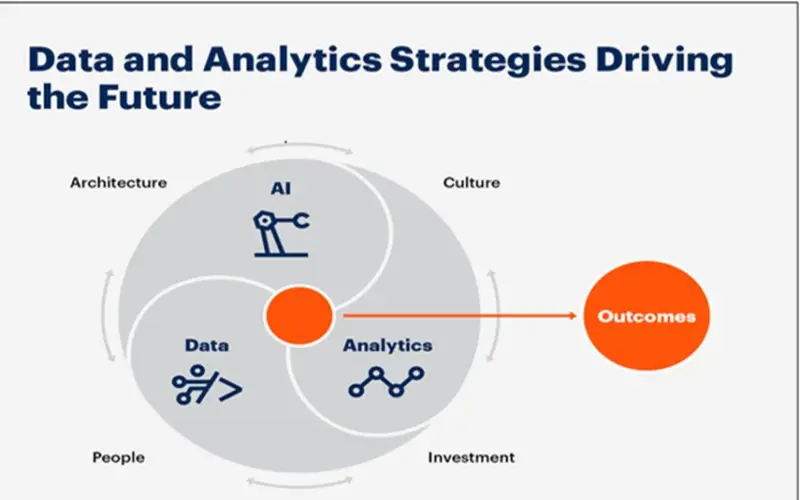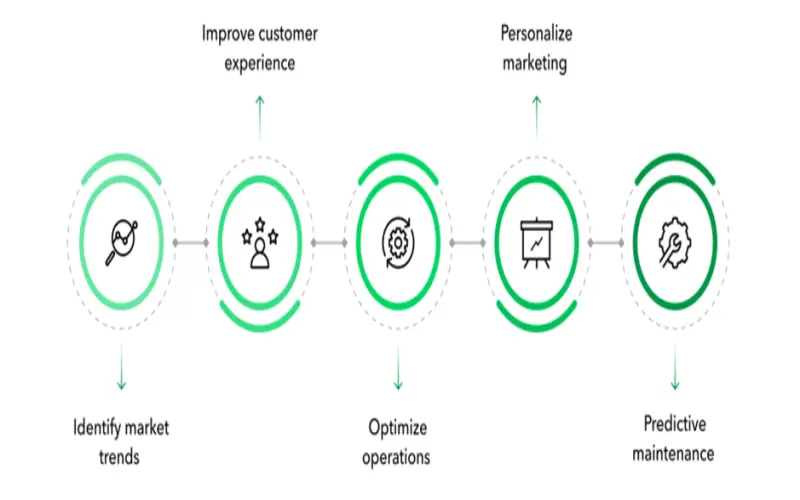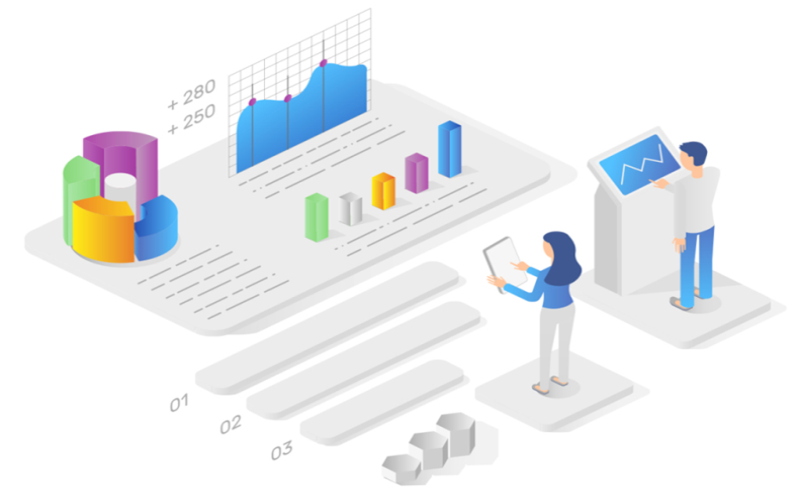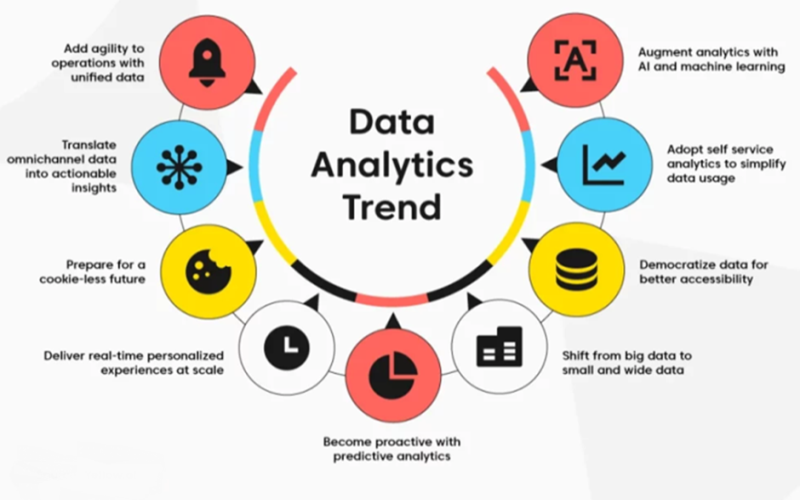The modern world is moving towards technology. Technology is now the key element of business growth in modern times. The new generation is more tech-dependent, and the right use of technology in work can enhance efficiency and quality, creating a competitive edge for businesses.
The most useful technology for businesses in modern times is data analytics, which is related to gathering and analyzing market and customer data, including their position, demands, needs, and supply. This is the reason why new-day startups are growing rapidly in comparison to old-time businesses, and data is playing a vital role in their growth by becoming the foundation for them.
Collecting and analyzing data helps businesses understand trends and patterns related to the demand and supply chain between a provider and a customer. The shift to technology carries a small amount of risk along with it, as gathering, managing, handling, and analyzing data is not easy and requires a certain amount of time and research.
1. Decision Making
Data analytics is a powerful tool that can help businesses gain insights into their operations and customers. By analyzing data, businesses can identify patterns & trends that may not be immediately apparent, which can help them make informed decisions regarding their products & services. This decreases the reliance on gut instincts and guesswork, leading to better decision-making. Predictive analytics, a subset of data analytics, can also help businesses plan for the future by making predictions about future events and outcomes using advanced data analytics methods. This can help businesses remain flexible and up-to-date in the rapidly changing technology landscape, as AI continues to transform the industry.

2. Improving Efficiency
In today’s competitive business environment, companies must operate with maximum efficiency. One of the most effective ways to achieve this is by leveraging data analysis to identify areas where resources can be better allocated. This allows for enhanced operational efficiency and cost optimization, which in turn can free up resources that can be redirected towards more impactful areas of the business. By reducing unnecessary costs and streamlining operations, companies can improve their bottom line and ultimately deliver better products and services to their customers. Efficiency is key when it comes to running a successful business. One way to achieve that efficiency is by analyzing data to identify areas where resources can be better utilized. This helps to optimize costs and improve operational efficiency, ultimately leading to better products and services.

3. Customer Understanding
Gaining a deep understanding of customers is essential for businesses, but it can be challenging to analyze. Fortunately, data analytics can help companies collect and interpret customer preferences and requirements. This knowledge can guide modifications to products or services, allowing for personalized marketing strategies that enhance customer satisfaction and loyalty. As a result, customers are more likely to return, making the business their top priority.

4. Competitive Advantage
In a crowded marketplace, gaining a competitive edge is crucial for business sustainability. Data analytics can give businesses an upper hand over their competition and keep them ahead of the curve. By identifying trends, anticipating market changes, and adapting strategies accordingly, data analytics can make products more valuable to customers. Those who can implement data analytics hold the power and can establish themselves as market leaders by adapting to changes from time to time and maintaining updates before the competition.

5. Risk Management
Risk is the foundation of every business and is inherent in every business. However, with data analytics, companies can better anticipate, mitigate, and manage these risks. Analyzing trends and markets minimizes threats, ensuring long-term sustainability. Identifying risks is a necessity for every business. Risks are of multiple categories, and not all risks are potential threats for each business. Data analytics allows for the categorization of risks in the business, so the focus must remain on the most critical issues, and the company must allocate its resources accordingly to improve its services and provide its customers with a better experience than others.

6. Cost Optimization
Money is the soul of every business, and managing that money within the business is a key aspect. Cost optimization plays a vital role in sustaining competition for every business. Data analytics helps by tracing and analyzing expenses, leading businesses to rethink their costing and investing strategies and recalculate resource utilization. Wasteful spending is like the corrosion of iron; it not only erodes profit but also the time and effort made by everyone. Cost optimization is not achieved by compromising the quality of products and services provided to customers.

7. Future Planning
Analyzing current data can predict future consumption, requirements, and growth probabilities. This capability is invaluable for strategic planning, resource allocation, and fulfilling customer needs. Future planning uses predictive analytics to forecast future trends and outcomes using historical data. Businesses can stay ahead of their competition by predicting changes in trends and needs of their customers over time, giving them a superior position in the marketplace. All changes are made by maintaining the requirement of enhanced quality according to future use.

8. Employee Performance
Data analytics is not only about optimizing customer-facing aspects but also about optimizing internal aspects and employee performance. Employees are the building blocks of every business, so they must know their strengths and weaknesses, and undeveloped and underperforming areas within the firm. This information can be used for targeted training programs, talent management, and creating a better work environment among employees, enhancing their productivity and job satisfaction. Ultimately, using data analytics for workforce enhancement can improve overall organizational growth.

9. Instant Insight And Agility
Data analytics is a powerful tool that helps businesses gain instant insights into their operations, customer interactions, and business efficiency. By providing an up-to-date view of the business, data analytics enables quick decision-making and rapid response to changes. With the ability to identify current events and trends, businesses can adopt strategies that allow them to remain responsive to an ever-changing environment. This helps businesses stay ahead of the competition and tackle future challenges with confidence.

10. Improving ROI
Data analytics precisely traces investments, expenses, customer engagements, and overall conversion rate. ROI- Return on Investment(s) is what businesses are meant for. Data analytics provides information about business performance, customer behavior, and the company’s expenses, which helps them refine their business strategies, campaigns, marketing, and resource consumption to grow their business. Refining strategies can be used to start personalized marketing campaigns targeting customers personally, which increases conversion rates.


















